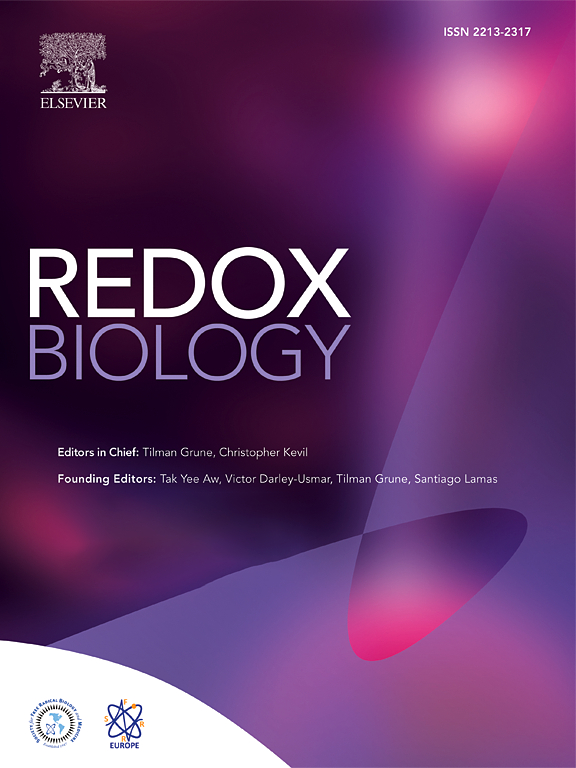破坏典型 AHR 介导的肝细胞 PKM2 表达会损害抗氧化防御功能,并增加 TCDD 诱导的肝毒性
IF 10.7
1区 生物学
Q1 BIOCHEMISTRY & MOLECULAR BIOLOGY
引用次数: 0
摘要
丙酮酸激酶 M2 同工酶的代谢重编程与细胞增殖和活性氧(ROS)防御有关。2,3,7,8-四氯二苯并-对-二恶英(TCDD)是一种可诱导 ROS 和肝毒性的环境污染物,它可剂量依赖性地诱导肝脏中的丙酮酸激酶肌同工酶 M2(PKM2)。为了进一步研究它在对抗 TCDD 肝毒性中的作用,我们构建了一种 PkmΔDRE 小鼠,它缺乏介导芳基烃受体(AHR)诱导的二恶英反应元件。在 PkmΔDRE 小鼠和从 AHR 基因敲除模型(AHRV375Afl/flAlb-CreERT2)中分离的原代肝细胞中,TCDD 未能诱导肝 PKM2,这表明诱导是依赖于 AHR 的。野生型(WT)小鼠和 PkmΔDRE 小鼠在每 4 天接受一次 TCDD 治疗并持续 28 天后,肝脏重量都会出现剂量依赖性增加。WT小鼠的谷胱甘肽(GSH)水平升高,而两种模型的氧化谷胱甘肽(GSSG)水平均升高,PkmΔDRE小鼠的GSH/GSSG比率下降了24倍,这表明其抗氧化和再循环能力较低。此外,PkmΔDRE 小鼠的 TCDD 诱导的纤维化更为严重,而 PkmΔDRE 小鼠的肝细胞在 TCDD 和过氧化氢联合处理后表现出更强的细胞毒性。TCDD 还能诱导人 HepaRG™ 细胞中的 PKM2,AHR 富集于基因座内的保守 DRE 核心。这些结果表明,AHR 介导的 PKM2 诱导是对 TCDD 的一种新型抗氧化反应。本文章由计算机程序翻译,如有差异,请以英文原文为准。
Disruption of canonical AHR-mediated induction of hepatocyte PKM2 expression compromises antioxidant defenses and increases TCDD-induced hepatotoxicity
Metabolic reprogramming by the pyruvate kinase M2 isoform is associated with cell proliferation and reactive oxygen species (ROS) defenses. 2,3,7,8-Tetrachlorodibenzo-p-dioxin (TCDD), an environmental contaminant that induces ROS and hepatotoxicity, dose-dependently induces pyruvate kinase muscle isoform M2 (PKM2) in the liver. To further investigate its role in combating TCDD hepatotoxicity, a PkmΔDRE mouse was constructed lacking the dioxin response element mediating aryl hydrocarbon receptor (AHR) induction. TCDD failed to induce hepatic PKM2 in PkmΔDRE mice and in primary hepatocytes isolated from an AHR knockout model (AHRV375Afl/flAlb-CreERT2), demonstrating induction is AHR dependent. Both wild-type (WT) and PkmΔDRE mice exhibited dose-dependent increases in liver weight after treatment with TCDD every 4 days for 28 days. Glutathione (GSH) levels increased in WT mice while oxidized glutathione (GSSG) levels increased in both models with a 24-fold decrease in the GSH/GSSG ratio in PkmΔDRE mice suggesting lower antioxidant and recycling capacity. Moreover, TCDD-induced fibrosis was more severe in PkmΔDRE mice while PkmΔDRE hepatocytes exhibited greater cytotoxicity following co-treatment with TCDD and hydrogen peroxide. TCDD also induced PKM2 in human HepaRG™ cells with AHR enrichment at a conserved DRE core within the locus. These results suggest AHR-mediated PKM2 induction is a novel antioxidant response to TCDD.
求助全文
通过发布文献求助,成功后即可免费获取论文全文。
去求助
来源期刊

Redox Biology
BIOCHEMISTRY & MOLECULAR BIOLOGY-
CiteScore
19.90
自引率
3.50%
发文量
318
审稿时长
25 days
期刊介绍:
Redox Biology is the official journal of the Society for Redox Biology and Medicine and the Society for Free Radical Research-Europe. It is also affiliated with the International Society for Free Radical Research (SFRRI). This journal serves as a platform for publishing pioneering research, innovative methods, and comprehensive review articles in the field of redox biology, encompassing both health and disease.
Redox Biology welcomes various forms of contributions, including research articles (short or full communications), methods, mini-reviews, and commentaries. Through its diverse range of published content, Redox Biology aims to foster advancements and insights in the understanding of redox biology and its implications.
 求助内容:
求助内容: 应助结果提醒方式:
应助结果提醒方式:


